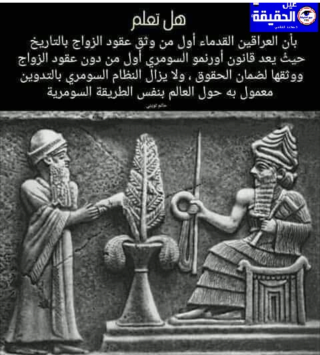Marriage ceremonies and ceremonies in ancient Iraq

After the family approves of the marriage, the groom brings gifts that were known to the Sumerians (Ni-de-a) and to the Babylonians as (biblu), but to the Assyrians they knew them as (zubullu), which are food items that are carried to the bride’s house in large dishes known as (hurruppate). At the same time, pieces of precious jewelry are presented, and the jewelry is considered the property of the bride until her husband dies, after which the wedding ceremony (marriage) is held and the groom provides food and drinks to his guests, meaning the groom takes care of the wedding expenses. The ceremony is an official announcement of the marriage as it is now at the present time. Then the girl’s father presents a gift to his daughter (seriktum) at her wedding, which is her share (zittum) of her father’s inheritance. The husband may present to his wife after marriage, in addition to the dowry he gave, some gifts and money as gifts or gifts (nubunnum) to guarantee the wife’s future.
Marriage ceremonies come as stipulated in the laws. One of the most important rituals I mentioned is the husband pouring oil on his bride’s head, one of the oldest rituals in ancient Iraq, as it appears to us from a paragraph mentioned in the text of Orunmkina’s reforms: (If a man pours... the oil, the ruler will take it (ensi)) Five shekels of silver, and sugal-mah received one shekel and one shekel of silver, and abgal received one shekel of silver.
The ancient laws did not mention the custom of pouring oil, except for the Assyrian laws. Article (42) of these laws stipulated: “If a man pours oil on the head of a free woman on the day of ablution or brings wedding gifts on that day, [the gifts] cannot be taken back after that.” The texts indicate that washing was one of the marriage rituals (and this tradition is still practiced in some families today, by taking the bride to the bathroom). The cuneiform texts describe that the bride washes with water and soap, anoints her body with paint and perfume, her mouth with amber, and adorns her eyes with kohl, then wears expensive clothes and wears bracelets, rings, and hand-made necklaces. Of gold and precious stones, ready to receive the groom. On the wedding day, a feast (kirrum) was held. A feast (kirrum), in which food and drinks brought by the groom to the bride’s house (billum) are served. Friends and relatives of the grooms attend the wedding.
Sumerian encyclopedia
Source: websites

